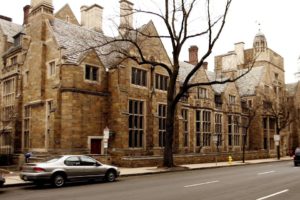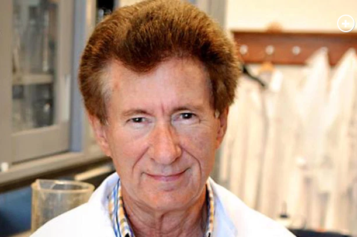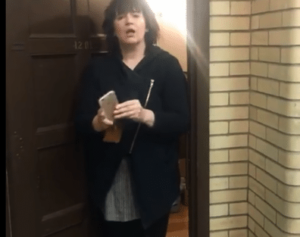
This Feb. 2, 2007 file photo shows Calhoun College, one of the 12 residential colleges housing Yale undergraduates at Yale University in New Haven, Conn. Photo by Bob Child/AP, File)
The president of Yale University, Peter Salovey, announced Wednesday that the institution would retain the name of Calhoun College, one of 12 residential colleges at the university, according to a press release issued by the Yale Office of Public Affairs and Communication.
The naming controversy began as students pushed the school to remove the name of slave owner and professed racist, John C. Calhoun, from the building. But Salovey thinks keeping the name will “encourage the campus community to confront the history of slavery, and to teach that history and its legacy.” The title of “master of residential colleges” will be changed to “head of college” however.
The press release also states that the university has decided to name two of its newest residential colleges after Anna Pauline “Paulie” Murray and Benjamin Franklin. Per the New Haven Register, Murray was a 1956 Yale Law School graduate and Black feminist who fought to end segregation and discrimination against women. Benjamin Franklin, one of America’s founders, received an honorary degree from Yale in 1753. Though he did own enslaved Africans, Franklin had a “conversion experience,” after which he became an abolitionist. The new residential colleges are set to open in 2017.
“We are a university whose motto is ‘light and truth,’”Salovey said. “Our core mission is to educate and discover. These ideals guided our decisions. Through teaching and learning about the most troubling aspects of our past, our community will be better prepared to challenge their legacies. More than a decision about a name, we must focus on understanding the past and present, and preparing our students for the future.”
He went on to assert that changing the title of ‘master,” which was “cringe-worthy” to students and staff, wouldn’t impede Yale’s educational mission, but elimination of John C. Calhoun’s legacy would, the New Haven Register reports. Salovey says that removing Calhoun’s name would “reduce the likelihood that the legacy of slavery would be more likely to be taught” and discussed among the Yale community.”
Instead he encouraged students to avoid changing history “because it offends them.” That would violate Yale’s educational mission and result in the loss of “this salient reminder of the stain of slavery and our participation in it.”
As the naming controversy comes to close, some students were satisfied with the university’s decision to keep the name while others thought more should be done to address the university’s dark past.
According to the New Haven Register, an undergraduate student who wished to remain anonymous said he is fine with the university’s decision,
“I think that they can support their decision with good reason,” he said.
Graduate student Maria Mahone said she would have preferred a name change and wouldn’t want to be associated with a college whose namesake has ties to slavery.
“It’s part of our heritage, but it’s not a part that we should celebrate, and I think by keeping the name, that is what they are doing,” she said. “I’m sure there are others who are worthy of having a building named for them with a more acceptable history. I think they should have changed it.”
Other prestigious universities have opted to acknowledge their racist pasts and role slavery played in the history of the universities. Clemson University placed markers around their campus to commemorate the life and labor of enslaved Africans who helped build the institution into what it is today. Per The New York Times, Harvard Law also abandoned its 80 -year-old crest which displayed the slave-owning family that financed the institution. Georgetown University removed the names of 2 school presidents involved in the selling of 272 Black people in bondage, which saved the institution from financial ruin.


